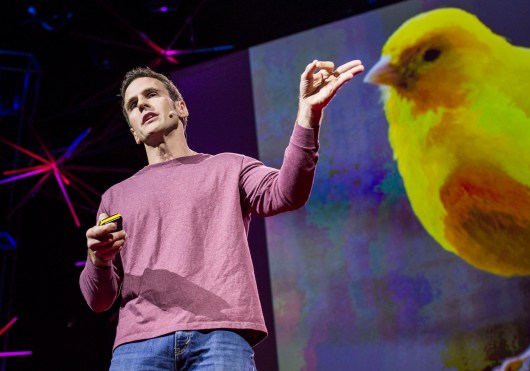A reformed computational neuroscientist, professor Read Montague takes the stage and admits he’s nervous. Then he asks the audience to put their hands up if they think they have a behavioral superpower. “Oh! I actually see hands! TED really is a superconference.”
Montague is here to talk about people, relationships, and brains. As he tells us, we can now eavesdrop healthily on brain activity without the need for needles or radioactivity. Using fMRI, we can make “microscopic blood movies.” Why is this significant? Well, in the brain, changes in neural activity are correlated with bloodflow, meaning that a blood movie is a proxy for brain activity. It’s early days, but this is still something of a revolution.
Not least because neuroscientists can now look beyond prep subjects such as fruitflies, worms or rodents to use human beings. And that, says Montague, is huge.
One way in which Montague has been conducting research is by inviting his subjects to play games that will trigger dopamine, the hugely powerful chemical that can persuade us all to do incredible things — some good, some awful. He reminds us of the Heaven’s Gate cult, whose members committed mass suicide by denying their internal human instincts for survival.
His work has borrowed games from the fields of experimental economics and behavioral economics. “These games require that you have a lot of cognitive apparatus online,” he says. “You have to remember what you’ve done, you have to update your model based on signals coming back. You have to do something that’s interesting.” Signals transmitted throughout this process are multiple, varied, subconscious — and fascinating to watch.
So the team has devised new kinds of tests to exploit this. And it seems that human beings are somewhat like canaries of old, which detected the buildup of carbon dioxide in mines and swooned as an early warning system. Humans are the canaries of social settings. So far, the Roanoke Brain Study has tested nearly 6,000 people, and patterns are beginning to emerge.
Here’s the super-exciting part of this: They’ve managed to connect the fMRI machines over the Internet. This so-called hyper-scanning means that doctors can eavesdrop on two brains at once, while individuals can now play brain games against each other rather than against computers. That means that scientists can get true insight into cognition–and they can monitor people with other forms of brain damage. That means that scientists can understand human beings more deeply.
After all, he concludes: “Our minds depend on other people, and they’re expressed in other people. You often don’t know who you are until you see yourself interacting with people you’re close to, with your enemies or those who are agnostic to you.” It’s early days, in other words, but this is no less than an experiment into discovering the meaning of our humanity.
Photos: James Duncan Davidson


Comments (1)
Pingback: TEDxErbil